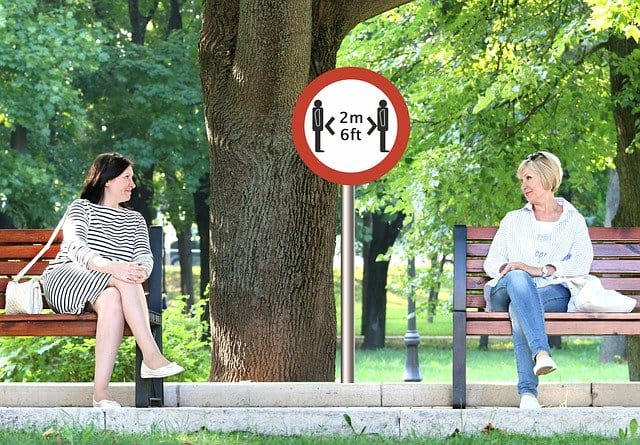A new study on social distancing has observed that a meter is not always enough to protect against infections
A new study published in the British Medical Journal disproves the absolute effectiveness of the meter distancing in the fight against the coronavirus. Nicholas Jones from the University of Oxford, pointed out that “the suggested rules are based on a simplistic dichotomy that describes the contagion of the virus as the emission of more or less large particles, emitted in isolation without taking into account the exhaled air“.
Coronavirus, the study on distancing
Therefore, these are not always valid observations, which could compromise the protection offered by the distancing depending on the situation in which one finds oneself. The assumption is that not all droplet emanations, the droplets on which the coronavirus is carried, move at the same speed. Coupled with the fact that the coronavirus can remain suspended in the air, according to another recent study.
According to the authors of the study, the social distancing rules should not be the same for every situation but should be reformulated from time to time, based on the places (whether outdoors or indoors), the ventilation of the environment and the maska are used or not.
Those who wear masks tend not to respect the distance, as they feel safer and more protected: these are the observations that emerged from an analysis conducted by a team of behavioral researchers from the Warwick Business School.
Furthermore, the viral load of infected individuals, as well as the duration of exposure to the virus, also increases the risk of contamination.
Distance, specific rules for each environment
According to the study, the distance to be maintained in closed and crowded places such as bars and clubs should be two meters. It may be less in less crowded situations. It is also very important to take into account the exposure time, as the threshold beyond which the risk increases is 5-15 minutes .
According to what was observed by the Sage (Scientific Advisory group for Emergencies) the virus is transmitted from two to ten times more if you stay only one meter away, compared to two meters.
Coronavirus, strategies to reduce the risk of transmission
The social distancing, however important, is not the only way to lower the risk of contagion. The authors of the study in fact note that “physical distance should only be considered as part of the general approach to contain the Covid-19 pandemic and should be used in combination with other strategies to reduce the risk of transmission, including washing the hands, regular cleaning of surfaces, the use of protective devices and masks when needed, strategies for sanitizing the air and isolating affected people”.
